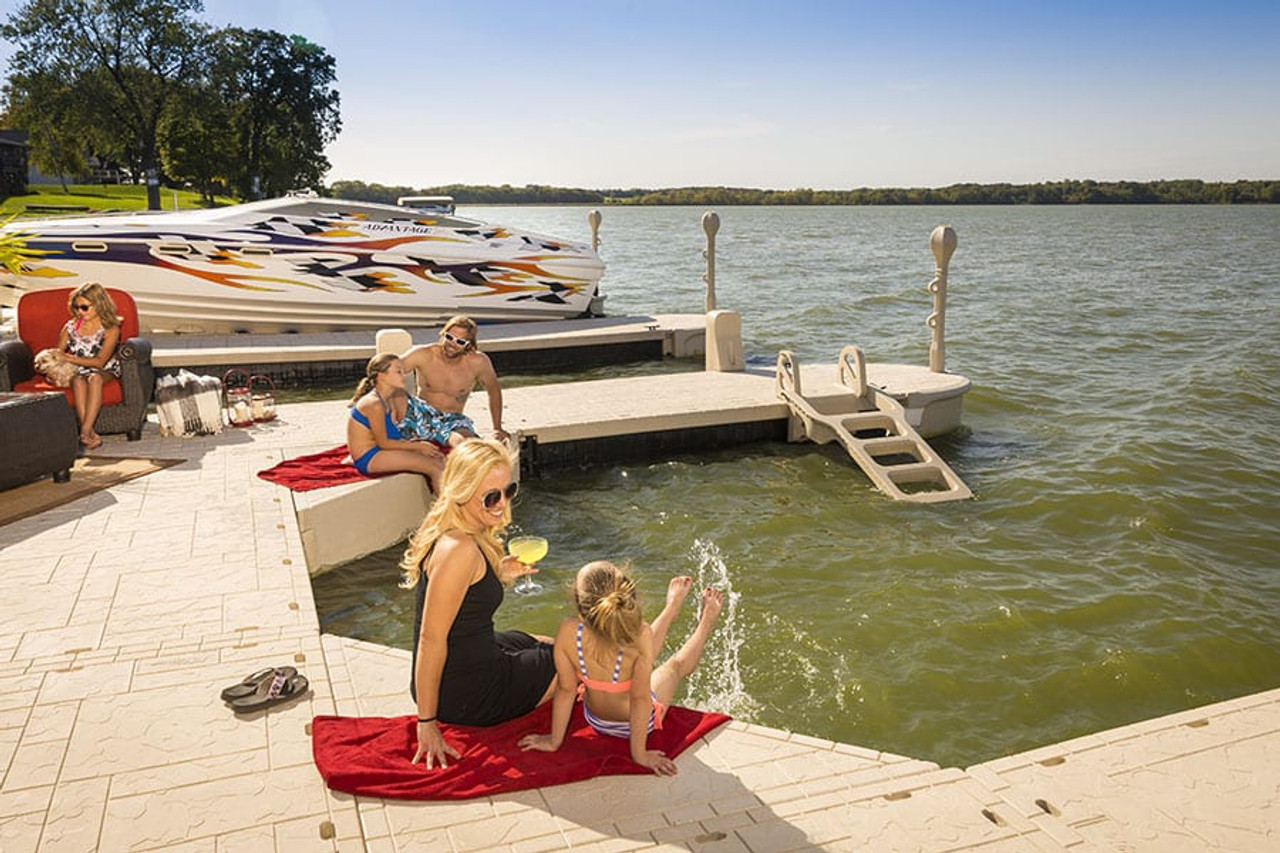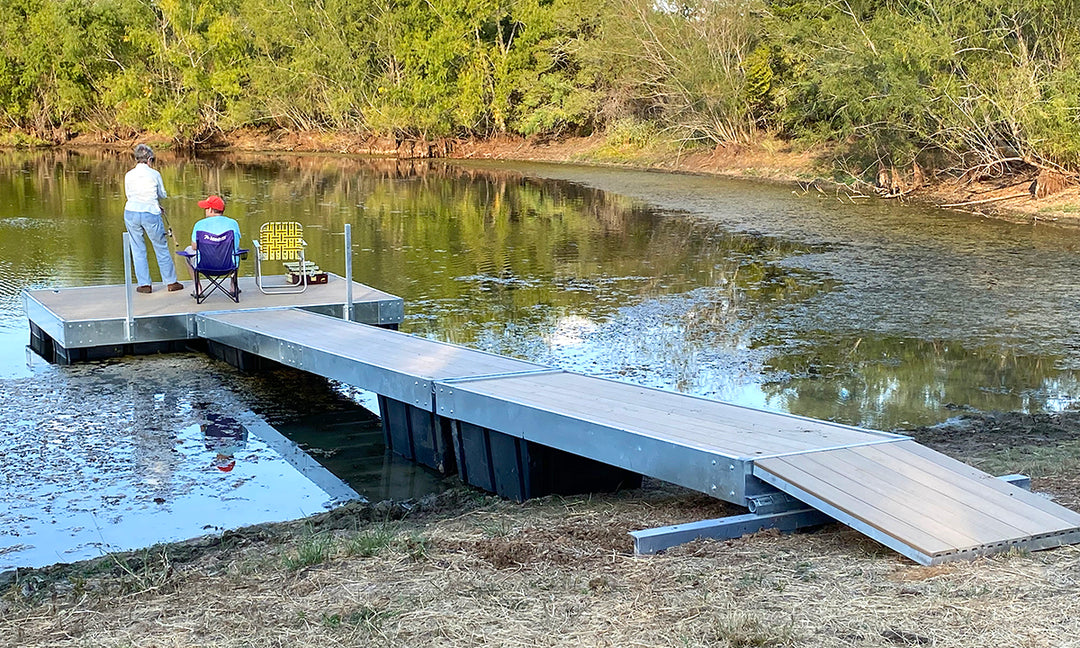Floating Docks: The Perfect Option for Versatile Water Accessibility
Floating docks existing a compelling service for a selection of water gain access to requires, providing flexibility that goes beyond typical mooring alternatives. The modular nature of floating docks promotes modification, providing to particular demands.
Advantages of Floating Docks
Floating docks offer various benefits that enhance water accessibility for different applications. Their ability to fluctuate with transforming water levels makes them especially useful in environments with changing tides or seasonal variations. This versatility makes certain that vessels can conveniently anchor without worry for the water's deepness, offering a reliable system for leisure, business, and commercial uses.
Additionally, floating docks are frequently constructed from long lasting materials that resist corrosion, making them ideal for lasting use in marine settings. Their installation is commonly much less intrusive than standard set docks, decreasing the environmental effect and helping with quicker deployment (floating dock services). This adaptability permits simpler relocation or reconfiguration according to individual needs or environmental modifications
Safety and security is an additional key benefit; floating docks can supply stable access for individuals getting off or boarding from boats and minimize the danger of crashes connected with unstable surfaces. Moreover, they can be designed to accommodate a range of accessories, such as fenders and cleats, enhancing performance. Overall, floating docks represent an effective option for boosting water access across diverse markets while promoting safety and environmental sustainability.

Kinds of Floating Docks
Numerous kinds of floating docks cater to various demands and environments, each designed with specific attributes to enhance capability. The most typical kinds consist of modular docks, which include interlocking areas that permit easy personalization and growth. These docks are perfect for recreational usage, as they can be customized to fit different boat sizes and water conditions.
One more prominent alternative is the stationary floating dock, which stays anchored in position but floats with transforming water levels. floating dock builder. This type is especially fit for locations with marginal tidal fluctuations, providing stable gain access to for angling or swimming. Additionally, there are drive-on docks, which feature a sloped layout that enables boats to easily drive on and off, making them ideal for personal watercraft and smaller vessels
For industrial applications, sturdy floating docks are offered, constructed from strengthened products to withstand substantial lots and harsh aquatic settings. Last but not least, environmentally friendly floating docks use sustainable products and designs to reduce environmental impact, typically incorporating features like plants to sustain local wild animals. Comprehending the various kinds of floating docks ensures that customers can choose one of the most appropriate remedy for their particular demands.
Installation Refine Introduction
An effective setup of floating docks requires careful preparation and focus to information to guarantee optimum performance and safety and security. The preliminary action includes evaluating the site problems, including water depth, present, and prospective barriers. This evaluation notifies the Check Out Your URL option of the suitable dock products and design customized to the certain environment.
Next, acquiring required authorizations is critical, as numerous jurisdictions have laws concerning building and construction on water bodies. Once consents are secured, the installation can continue. Begin by preparing the foundation, which may include anchoring systems or pilings tailored to the dock type and local conditions.
Complying with the structure setup, set up the dock sections according to producer specs. Ensure that all parts are securely secured and aligned to withstand environmental stress and anxieties. Placement the dock in the marked location, guaranteeing it is degree and stable.

Upkeep Tips and Finest Practices
After the setup procedure is complete, ongoing maintenance plays an essential role in guaranteeing the durability and performance of floating docks. Regular examinations must be performed to recognize any type of indicators of wear and tear, wear, or damage - floating dock company. Look for any kind of loose fittings, fractures, or splitting up in the dock areas, as these can compromise architectural stability
Cleaning the dock is important to remove debris, algae, and various other build-up that can influence its look and safety and security. Use a gentle stress wash periodically to keep sanitation without causing damage to the surface. Additionally, applying a protective sealer every few years can aid improve longevity and withstand ecological wear.
Pay focus to the mooring lines and supports, ensuring they are cost-free and protected from deterioration. Change any kind of abject elements immediately to stay clear of risks. Seasonal adjustments might also be required; throughout extreme weather, enhancing the dock or repositioning can avoid damage.
Applications for Floating Docks
Floating docks offer a wide variety of applications, satisfying both recreational and commercial demands. In entertainment settings, they give smooth access to rivers for activities such as boating, angling, and swimming. Their adjustable nature enables installation in varying water degrees, ensuring steady and safe gain access to no matter tidal fluctuations.
Commercially, floating docks are vital for click marinas and waterside services. They help with the docking of vessels, making it possible for effective loading and discharging of goods. Their modular design permits very easy growth or reconfiguration to suit altering business needs, making them perfect for watercraft rentals, excursion operations, or fishing charters.
Furthermore, floating docks are utilized in ecological applications such as marine study and environment remediation. They can work as platforms for scientific researches, monitoring water high quality, or carrying Discover More Here out wild animals surveys without disturbing sensitive ecological communities.
In commercial contexts, floating docks are employed in building projects, offering accessibility to hard-to-reach locations for devices and employees. Their versatility, resilience, and marginal influence on the atmosphere make them an ideal choice for a vast array of applications, improving both functionality and access in various water-based settings.
Final Thought
In conclusion, floating docks stand for an optimal option for diverse water gain access to requires, owing to their versatility, durability, and modular layout. Floating docks offer as a valuable asset for leisure, industrial, and environmental projects, making certain dependable accessibility to rivers and promoting lasting practices in marine settings.
Floating docks present an engaging option for a selection of water accessibility requires, using adaptability that transcends traditional mooring alternatives.Floating docks offer countless advantages that enhance water access for numerous applications. Generally, floating docks stand for a reliable service for enhancing water gain access to across diverse industries while promoting safety and security and environmental sustainability.
Another preferred alternative is the fixed floating dock, which continues to be secured in place but floats with transforming water levels.In conclusion, floating docks stand for an optimum option for varied water access needs, owing to their flexibility, sturdiness, and modular style.
Comments on “Floating Docks: The Smart Choice for Modern Waterfront Living and Entertainment”